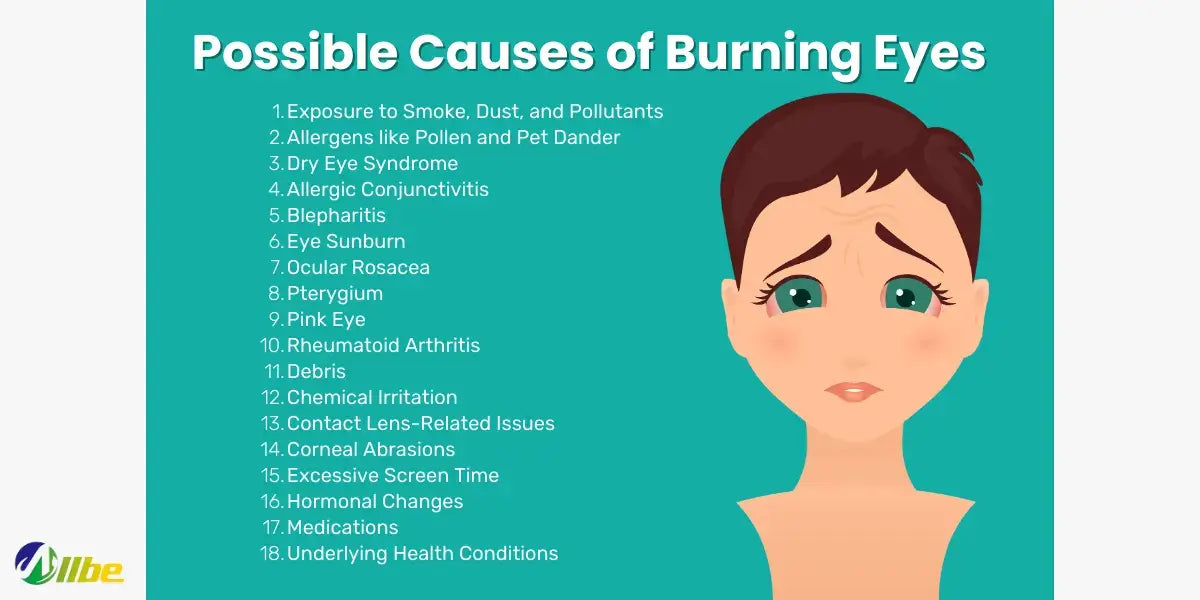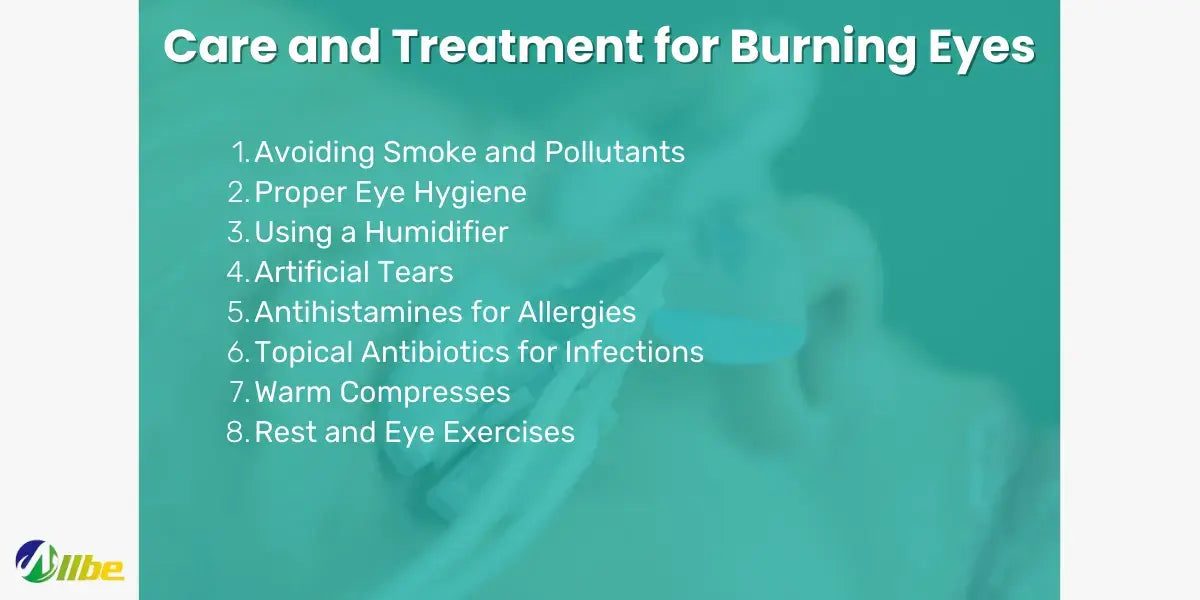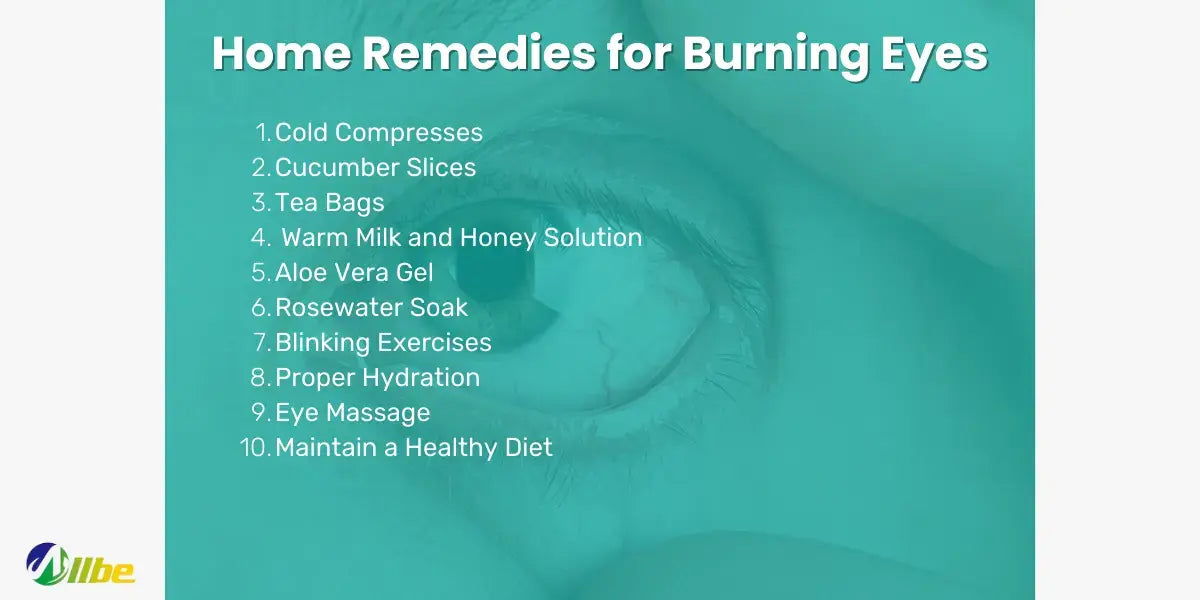
Burning Eyes (Causes, Symptoms, and Treatment)
Burning eyes, marked by a burning sensation, itching, and redness, can arise from various causes, including environmental factors (like smoke and allergens) and health conditions (such as dry eye syndrome or allergies). Symptoms may also include excessive tearing, light sensitivity, and blurred vision.
Timely diagnosis through eye examinations is crucial for tailored treatment. Treatments range from lifestyle adjustments, eye drops, and antibiotics to advanced procedures. Home remedies, like cold compresses and proper hydration, can provide relief.
Prevention involves protective measures, like eyewear and good hygiene, to reduce triggers. Regular eye check-ups and proactive health choices contribute to long-term eye health and comfort. Prompt medical attention is vital for severe or persistent symptoms.
By understanding, preventing, and managing burning eyes, individuals can enhance their eye health and overall well-being.
18 Causes of Burning Eyes

1. Exposure to Smoke, Dust, and Pollutants
Inhalation of smoke, dust, airborne pollutants, or irritants can cause irritation and burning sensations in the eyes. Particles present in the air can come into contact with the eyes, leading to discomfort.
2. Allergens like Pollen and Pet Dander
Allergic reactions to common allergens such as pollen, pet dander, mold spores, or other environmental triggers can cause burning, itching, and redness in the eyes, particularly in individuals with allergies.
3. Dry Eye Syndrome
Dry eye syndrome occurs when the eyes do not produce enough tears or the tears evaporate too quickly. This can result in a persistent burning or gritty sensation in the eyes, often accompanied by redness and sensitivity to light.
4. Allergic Conjunctivitis
Allergic conjunctivitis is an inflammation of the conjunctiva (the clear tissue covering the white part of the eye) due to allergens. It can cause burning, itching, redness, and watery eyes.
5. Blepharitis
Blepharitis is inflammation of the eyelids that can cause burning, itching, and irritation. It often results from bacterial overgrowth at the base of the eyelashes.
6. Eye Sunburn
Prolonged exposure to intense sunlight or ultraviolet (UV) rays without adequate eye protection can cause a sunburn-like effect on the eyes, leading to discomfort, redness, and a burning sensation.
7. Ocular Rosacea
Ocular rosacea is a subtype of rosacea that affects the eyes. It can cause burning, stinging, and redness of the eyes, often accompanied by eyelid inflammation (blepharitis) and dry eye symptoms.
8. Pterygium
Pterygium is the growth of pink, fleshy tissue on the conjunctiva, often associated with exposure to UV light, wind, and dust. It can cause a sensation of irritation and burning in the affected eye.
9. Pink Eye (Conjunctivitis)
Pink eye, caused by a viral or bacterial infection or allergies, can lead to redness, itching, and a burning sensation in the eyes. It may also cause discharge and crusting around the eyes.
10. Rheumatoid Arthritis
Rheumatoid arthritis, an autoimmune disorder, can sometimes cause ocular complications like dry eyes and inflammation, resulting in a burning sensation in the eyes.
11. Debris
Foreign debris or particles, such as dust, sand, or small foreign objects, coming into contact with the eyes can cause irritation and a burning feeling. Activities like working in dusty environments, woodworking, or being in windy conditions without eye protection can increase the likelihood of debris entering the eyes and causing discomfort.
12. Chemical Irritation
Exposure of the eyes to irritating chemicals, whether in the form of household cleaning agents, fumes, or accidental splashes, can lead to a burning sensation, redness, and severe discomfort. Immediate rinsing of the eyes with water is essential in such cases to minimize damage and alleviate the sensation.
13. Contact Lens-Related Issues
Prolonged use of contact lenses, improper hygiene, wearing damaged lenses, or allergic reactions to lens solutions can cause burning eyes. This discomfort may also indicate an ill-fitting lens or underlying infection.
14. Corneal Abrasions
Corneal abrasions, often caused by a foreign object scratching the cornea (the clear front surface of the eye), can result in intense pain, redness, tearing, and a sensation of burning or grittiness in the affected eye.
15. Excessive Screen Time
Prolonged exposure to digital screens, such as those from computers, smartphones, or tablets, can lead to digital eye strain or computer vision syndrome. This can cause burning eyes, dryness, blurred vision, and discomfort, collectively referred to as asthenopia.
16. Hormonal Changes
Hormonal fluctuations, such as those occurring during menopause or pregnancy, can lead to changes in tear production and composition, potentially resulting in dryness and a burning sensation in the eyes.
17. Medications
Some medications, particularly those with side effects related to ocular dryness, can contribute to a burning feeling in the eyes. It's essential to consult a healthcare professional if experiencing persistent discomfort while on medication.
18. Underlying Health Conditions
Certain systemic health conditions like diabetes, Sjögren's syndrome, lupus, and thyroid disorders can manifest symptoms in the eyes, including dryness, redness, and a burning sensation. Proper management of these conditions is crucial to alleviate eye discomfort.
Symptoms of Burning Eyes
1. Sensation of Burning or Stinging in the Eyes
Individuals experiencing burning eyes often describe a persistent sensation of heat, stinging, or burning within the eyes. This discomfort can vary in intensity and may be localized to specific areas of the eye or spread across the entire eye surface.
2. Itchiness and Redness of the Eyes
Burning eyes are frequently accompanied by intense itching and redness. The itching sensation can be bothersome and can exacerbate the overall discomfort. Redness occurs due to the dilation of blood vessels in response to irritation or inflammation.
3. Excessive Tearing or Watery Eyes
Paradoxically, burning eyes can trigger excessive tearing or a watery discharge. The eyes attempt to flush out irritants or foreign particles, resulting in increased tear production. This can be distressing and may blur vision temporarily.
4. Light Sensitivity (Photophobia)
Many individuals with burning eyes become sensitive to light, a condition known as photophobia. Exposure to bright light sources like sunlight, artificial lighting, or even computer screens can intensify the discomfort, making it difficult to keep the eyes open or focus on tasks.
5. Blurred Vision
Burning eyes may lead to temporary blurred vision. This blurriness can occur due to excessive tearing, irritation, or a disruption in the tear film, which is essential for maintaining clear vision. It can further impede daily activities that require visual concentration, such as reading or driving.
How to Diagnose Burning Eyes
To diagnose burning eyes, a comprehensive examination by an eye specialist is conducted. This includes a thorough review of symptoms, medical history, and potential environmental influences. Tests like tear quantity assessment and eye surface examinations are done to understand the condition. The results guide the identification of causes and severity, which is crucial for planning the right treatment approach.
Care and Treatment for Burning Eyes

1. Avoiding Smoke and Pollutants
Minimizing exposure to smoke, air pollution, and other environmental irritants can significantly reduce eye irritation and the sensation of burning. This includes avoiding secondhand smoke and staying indoors on days with poor air quality.
2. Proper Eye Hygiene
Maintaining good eye hygiene is crucial. This involves gently cleansing the eyelids and lashes with mild, non-irritating cleansers to remove debris, bacteria, and accumulated oils, especially in the case of blepharitis.
3. Using a Humidifier
Using a humidifier in indoor spaces can help add moisture to the air, preventing excessive evaporation of tears and reducing the likelihood of dry eyes and associated burning.
4. Artificial Tears and Lubricating Eye Drops
Regular use of artificial tears and lubricating eye drops can provide relief by moistening the eyes and alleviating dryness, a common cause of burning eyes. These drops help maintain the tear film and reduce irritation.
5. Antihistamines for Allergies
For individuals with allergic conjunctivitis causing burning eyes, antihistamine eye drops can help alleviate symptoms by reducing allergic reactions and associated discomfort.
6. Topical Antibiotics for Infections
In cases where burning eyes result from bacterial infections like conjunctivitis, prescribed topical antibiotics may be necessary to clear the infection and alleviate symptoms.
7. Warm Compresses and Lid Hygiene for Blepharitis
Regular application of warm compresses and gentle lid hygiene techniques can help manage blepharitis, reducing inflammation and improving overall eye comfort.
8. Rest and Eye Exercises
Taking breaks and getting sufficient rest, especially during prolonged screen time, can help reduce eye strain and burning sensations. Additionally, simple eye exercises, such as rolling the eyes or focusing on distant objects, can help relax the eye muscles.
10 Home Remedies for Burning Eyes

Home remedies can offer relief and complement other treatments for burning eyes. However, if symptoms persist or worsen, it's important to consult a healthcare professional for a comprehensive evaluation and appropriate medical advice. Here are some effective home remedies:
1. Cold Compresses
Applying a cold compress over closed eyelids can help soothe burning eyes. The cold temperature constricts blood vessels, reducing inflammation and providing immediate relief.
2. Cucumber Slices
Placing chilled cucumber slices over closed eyes for about 15 minutes can provide a cooling effect and help alleviate eye irritation and redness.
3. Tea Bags
Chilled, damp tea bags (black or green tea) can be placed over closed eyelids for around 15-20 minutes. The natural properties of tea, including antioxidants and tannins, can help reduce inflammation and provide relief.
4. Warm Milk and Honey Solution
Mixing warm milk with honey and using it as an eye rinse can provide soothing relief for burning eyes. The combination helps to moisturize and calm the eyes.
5. Aloe Vera Gel
Applying pure aloe vera gel around the eyes can help reduce irritation and provide a cooling effect. Ensure the gel is free of added chemicals or fragrances.
6. Rosewater Soak
Soaking a cotton ball in rosewater and placing it on closed eyelids can provide a refreshing and soothing effect, reducing eye discomfort.
7. Blinking Exercises
Performing simple blinking exercises, such as blinking rapidly for a few seconds and then closing the eyes for a moment, can help spread tears evenly and relieve dryness and burning.
8. Proper Hydration
Staying well-hydrated by drinking plenty of water throughout the day can help maintain moisture levels in the eyes and reduce the sensation of burning.
9. Eye Massage
Gently massaging the area around the eyes with clean hands can improve blood circulation and provide relief from eye strain and discomfort.
10. Maintain a Healthy Diet
Consuming a balanced diet rich in omega-3 fatty acids, vitamin A, and antioxidants can support overall eye health and reduce the risk of dry eyes and related symptoms.
When to Seek Medical Help
Knowing when to seek medical help for burning eyes is crucial. If the burning persists despite home care, consulting an eye specialist is advised. Intense pain or sudden vision changes require immediate attention. Eye injuries or infections, chronic eye conditions, severe allergic reactions, or any eye trauma should prompt medical evaluation to prevent complications and ensure optimal eye health and comfort.
What are Gritty Eyes?
Gritty eyes, or dry eyes, are characterized by a sensation of grit or foreign particles in the eyes, accompanied by redness, itching, and discomfort. It's often caused by insufficient tears due to factors like environmental conditions (wind, smoke, dry air), prolonged screen use, allergies, or certain medical conditions like Sjögren's syndrome.
To ease gritty eyes at home, warm compresses can be applied to relax eye muscles and improve tear flow. Drinking enough water to stay hydrated and using a humidifier in dry environments helps combat dryness. Taking breaks during screen use and following the 20-20-20 rule reduces eye strain. Over-the-counter artificial tears offer relief by supplementing natural tears. If symptoms persist or worsen, seeking advice from an eye care professional is important for proper diagnosis and treatment.
Final Thoughts
Burning eyes, characterized by heat, stinging, or irritation, can be caused by various environmental factors and health conditions. Symptoms include burning, itching, redness, excessive tearing, light sensitivity, and blurred vision. Timely diagnosis and appropriate treatment are crucial for effective management and prevention of complications. Proactive measures like eye protection, good eye hygiene, and regular check-ups are essential for preventing and managing burning eyes, ensuring overall eye health and comfort. Taking these proactive steps can lead to a more comfortable and eye-healthy life.
